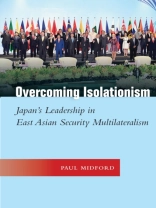This book asks why, in the wake of the Cold War, Japan suddenly reversed years of steadfast opposition to security cooperation with its neighbors. Long isolated and opposed to multilateral agreements, Japan proposed East Asia’s first multilateral security forum in the early 1990s, emerging as a regional leader. Overcoming Isolationism explores what led to this surprising about-face and offers a corrective to the misperception that Japan’s security strategy is reactive to US pressure and unresponsive to its neighbors. Paul Midford draws on newly released official documents and extensive interviews to reveal a quarter century of Japanese leadership in promoting regional security cooperation. He demonstrates that Japan has a much more nuanced relationship with its neighbors and has played a more significant leadership role in shaping East Asian security than has previously been recognized.
Tabella dei contenuti
1. Understanding Why States Pursue Regional Security Multilateralism
2. Japan and Its Regional Security Isolationism During the Cold War
3. Rethinking Regional Security Isolationism and Multilateralism
4. The Making of the Nakayama Proposal
5. Delivering and Defending the Nakayama Proposal
6. The Miyazawa Initiatives and Japan’s Leadership in Creating the ASEAN Regional Forum
7. Japan and Regional Security Multilateralism, 1994–2000
8. Japan and Widening Regional Security Multilateralism
Circa l’autore
Paul Midford is Professor in the Department of Sociology and Political Science and Director of the Japan Program at the Norwegian University of Science and Technology in Trondheim. His books include
Rethinking Japanese Public Opinion and Security: From Pacifism to Realism? (Stanford, 2011).












